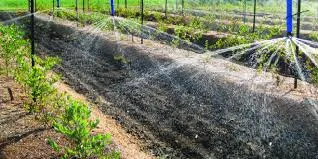Introduction
In the realm of modern agriculture, humic acid has emerged as a game-changer, revolutionizing soil health and plant growth. This article delves into the significance of humic acid and introduces you to the premier humic acid supplier in Barabanki, dedicated to elevating agricultural practices in the region.
Exploring the Power of Humic Acid
Composition and Formation
Humic acid is a natural compound resulting from the decomposition of organic matter, packed with essential elements crucial for plant development.
Soil Enrichment
It plays a pivotal role in enhancing soil structure, moisture retention, and nutrient availability, thereby contributing to overall soil health.
Varieties of Humic Acid
There are two primary types: humic acid and fulvic acid, each with distinct attributes that benefit soil and plants.
Impact of Humic Acid on Plant Growth
Nutrient Optimization
Humic acid functions as a chelating agent, optimizing nutrient uptake and mitigating nutrient loss through leaching.
Root Growth Stimulation
It stimulates root proliferation, leading to improved root branching and greater nutrient absorption, consequently enhancing plant vitality.
Stress Resilience
By bolstering a plant’s ability to endure stress, humic acid empowers it to withstand environmental adversities such as drought and disease.
Leading Humic Acid Supplier in Barabanki
Barabanki AgriSolutions: Forging Agricultural Progress
Barabanki AgriSolutions stands as a prominent supplier of premium humic acid products, committed to propelling agricultural advancement in the region.
Tailored Formulations
They offer customized humic acid formulations tailored to address the specific needs of various crops and soil types, ensuring optimal outcomes.
Expert Consultation
Barabanki AgriSolutions provides expert guidance on the precise application of humic acid, taking into account diverse crops and growth stages.
Elevating Agriculture through Humic Acid
Sustainable Farming Practices
The integration of humic acid aligns seamlessly with sustainable farming practices by reducing reliance on synthetic fertilizers.
Improved Nutrient Retention
Humic acid enhances soil’s cation exchange capacity, resulting in superior nutrient retention and improved nutrient uptake by plants.
Efficient Water Management
It augments soil’s water-holding capacity, curbing water wastage and contributing to efficient water management.
Conclusion: Fostering Agriculture with Humic Acid
As modern agriculture pivots toward eco-friendly and effective solutions, humic acid emerges as a potent tool that enhances soil fertility, nutrient accessibility, and overall crop yield.
Frequently Asked Questions
- Is humic acid compatible with organic farming practices? Absolutely, humic acid is a natural compound that aligns perfectly with organic farming principles, making it a valuable asset for organic growers.
- Can humic acid be used in hydroponic systems? Yes, humic acid can be introduced to hydroponic systems to enhance nutrient availability and stimulate plant growth.
- How does humic acid improve soil structure? Humic acid improves soil aggregation, leading to better soil structure, aeration, and drainage.
- Can humic acid replace conventional fertilizers entirely? While humic acid is beneficial for soil health, it is often used in conjunction with traditional fertilizers to maximize results.
- Is humic acid suitable for all soil types? Yes, humic acid offers benefits for a wide range of soil types, from sandy to clayey soils, as it enhances soil structure and nutrient availability.




